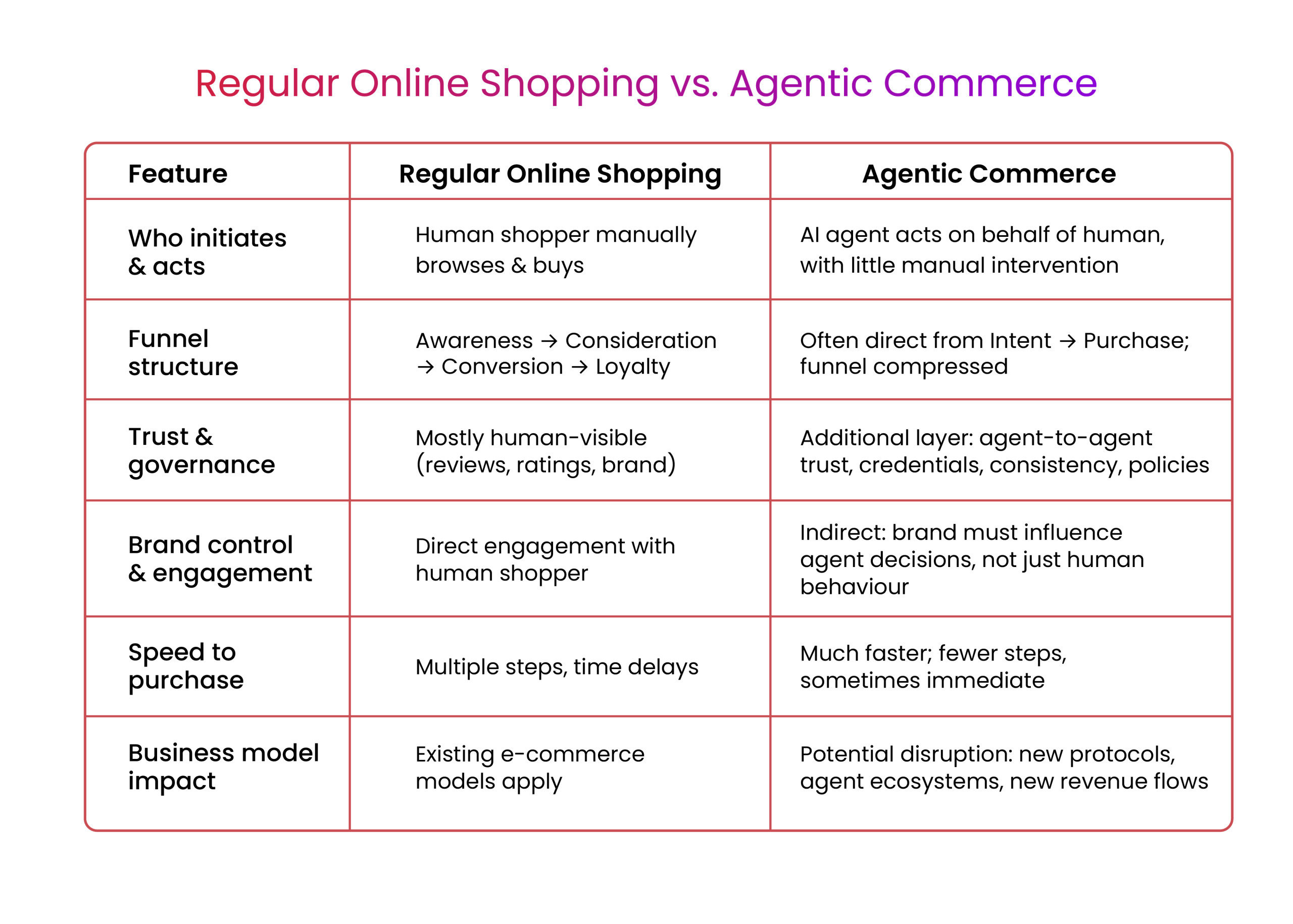AI Agents Are Already Redefining How We Shop
What if your next customer never visited your website – but still made a purchase through an AI assistant ? That’s not the future—it’s happening right now.
Welcome to the era of Agentic Commerce, where AI-powered agents discover, evaluate, and even transact on behalf of human customers. Platforms like ChatGPT, Perplexity, Amazon’s Rufus, and Walmart’s Sparky are already collapsing traditional eCommerce funnels, moving directly from intent to purchase in seconds.
In this new landscape, success is no longer about who has the best ads or the biggest marketplace presence—it’s about who’s visible, trusted, and machine-readable.
From Clicks to Conversations: The Collapse of the Funnel
For years, brands have optimized the human funnel – awareness, consideration, conversion, and loyalty. But AI agents compress that entire journey into a single, machine-time interaction.
A shopper now says:
“Find me a pair of sustainable sneakers under $150 that ship within two days.”
The agent filters results, checks reviews, verifies return policies, and recommends one or two products. The conversion happens instantly. No ad impressions. No retargeting. No checkout friction.
This new paradigm changes everything:
- If your product data isn’t structured, you won’t even be considered.
- If your site loads slowly, you’ll be skipped in milliseconds.
- If your policies aren’t consistent, you’ll be dropped for lack of trust.
Analysts predict that by 2028, 20% of all digital transactions will involve AI agents, and by 2035, up to 80% of internet traffic could be agent-driven. The early adopters of this shift will own the next decade of digital commerce.

Trust: The New Growth Catalyst
In a world where machines decide what humans buy, trust becomes the new currency of visibility.
AI agents only recommend products and merchants they can verify. That means every piece of your digital footprint—catalog data, pricing, reviews, and policy markup—must be accurate,structured, and aligned across systems.
Here’s what builds trust in the age of agents:
- Structured data: Schema.org and JSON-LD enable AI agents to understand product attributes without guessing.
- API precision: High-performance, low-latency APIs ensure agents don’t time out while fetching data.
- Governance and integrity: Consistent policies and authenticated data flow prevent confusion and fraud.
- Security and compliance: AI agents reward reliability. Even minor data discrepancies can make a brand invisible.
In this agent-driven world, trust replaces traffic as the ultimate growth driver.
Learn How an AI Shopping Assistant Simplifies the user Journey from Wishlist to Checkout
Preparing for Agentic Readiness
To thrive in this new paradigm, organizations must make their commerce ecosystems readable, trusted, and transactable for AI agents.
Here’s where to start:
- Audit Your Store for Agent Compatibility
Review your catalog markup, APIs, and site architecture. Are they machine-readable?
Do your policy pages use schema markup?
- Enable Secure, Structured APIs
Use GraphQL and REST layers to expose consistent product and pricing data—safely and efficiently.
- Unify Marketing, Product, and Security
Agentic commerce isn’t owned by one team. Marketing must optimize for AI discoverability, product teams must ensure API readiness, and security must protect against abuse.
- Build a Trust Stack
Implement layered defenses: identity assurance, rate limiting, fraud detection, and data integrity checks—so beneficial agents are welcomed and malicious bots are blocked.
The Human + Agent Future
Agentic commerce isn’t about replacing humans—it’s about empowering them.
AI agents will handle repetitive, structured interactions, freeing humans to focus on experience, storytelling, and emotional connection.
In the next 2–3 years, AI assistants will complete purchases autonomously. In 5+ years, we’ll see agent-to-agent negotiations shaping supply chains, pricing, and fulfillment.
The question is no longer if this will happen—but whether your brand will be ready when it does.
Final Thought
The rules of digital commerce are being rewritten.Those who adapt now—by investing in structured truth, trust, and performance—will lead the AI-native marketplace.
Those who build for machine trust today will own human loyalty tomorrow.









































